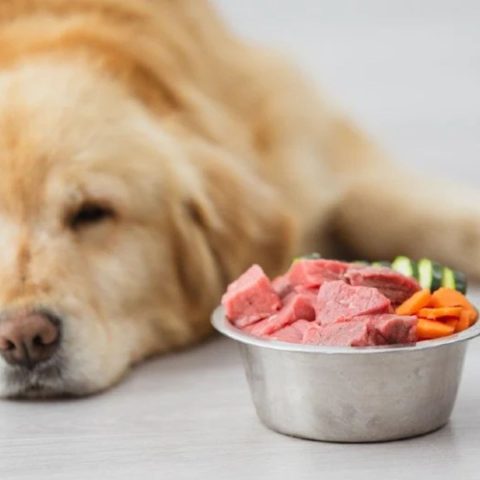As you watch your once-lively dog struggle to get up from their bed, you can’t help but wonder if there’s a way to turn back the clock. The truth is, your dog’s aging process is accelerated by their diet – or lack thereof. Just as a fine-tuned machine requires premium fuel to run smoothly, your senior dog needs a customized diet to support their unique nutritional needs. But what exactly does that entail, and how can you guarantee your furry friend is getting the right nutrients to thrive in their golden years?

Nutritional Changes With Aging
As your dog ages, its nutritional needs undergo significant changes that require adjustments to its diet to promote maximum health. The aging process affects your dog’s body in various ways, including changes in nutrient absorption. As your dog grows older, its digestive system becomes less efficient, leading to decreased nutrient absorption. This decline in nutrient absorption can result in deficiencies, which can further exacerbate the aging process.
It’s essential to monitor your dog’s nutrient intake and adjust its diet accordingly. A well-balanced diet that caters to your dog’s specific nutritional needs can help mitigate the negative effects of aging. For instance, senior dogs may require more fiber, antioxidants, and omega-3 fatty acids to support healthy digestion, joint health, and cognitive function. By providing your dog with a tailored diet, you can help support its overall health and well-being as it navigates the aging process.
Impact of Inadequate Nutrition
Failing to adjust your dog’s diet to meet its changing nutritional needs can have far-reaching consequences, including compromised health and accelerated aging. As your dog ages, its ability to absorb and process nutrients changes, making it more vulnerable to malnutrition risks. If you continue to feed your senior dog the same food it’s been eating its whole life, you may inadvertently be depriving it of essential nutrients. This can lead to nutrient deficiencies, which can manifest in a range of health issues, from dull coats and lethargy to more severe problems like digestive disorders and weakened immunity.
Without adequate nutrition, your dog’s body will start to break down its own tissues for energy, leading to muscle wasting and weight loss. This can create a vicious cycle of decline, making your dog more susceptible to illness and disease. By recognizing the importance of tailored nutrition for senior dogs, you can help mitigate these risks and support your dog’s overall health and well-being. By making informed choices about your dog’s diet, you can help promote it remains healthy, happy, and thriving in its golden years.
Joint Health and Mobility
As your senior dog ages, you’re likely noticing changes in their mobility and joint health. To address these issues, you’ll want to provide them with a diet that supports their joint health, and you’ll want to look for nutrients that provide pain relief, promote healthy cartilage growth, and improve mobility factors. By incorporating these key components into their nutrition, you can help your senior dog maintain a comfortable and active lifestyle.
Pain Relief Support
You can help alleviate your senior dog’s joint pain and stiffness by providing a diet rich in ingredients that support joint health and mobility. As your dog ages, its joints naturally deteriorate, leading to arthritis and inflammation. A diet tailored to their needs can make a significant difference in their quality of life. Look for ingredients like glucosamine and chondroitin, which have been shown to support arthritis management and reduce inflammation. These compounds help to lubricate joints, reducing friction and discomfort. Additionally, omega-3 fatty acids have potent anti-inflammatory properties, further alleviating joint pain. By incorporating these ingredients into your senior dog’s diet, you can help reduce their discomfort and improve their mobility. This, in turn, can lead to a more active and engaged lifestyle, allowing them to enjoy their golden years to the fullest. By providing your senior dog with a diet rich in joint-supporting ingredients, you can help them live a happier, healthier life.
Healthy Cartilage Growth
Healthy cartilage growth is essential for maintaining joint health and mobility in senior dogs, and a diet rich in specific nutrients can support this process. As your dog ages, cartilage development slows down, leading to joint pain and stiffness. A well-balanced diet can help promote healthy cartilage growth, reducing the risk of joint issues. You can support your senior dog’s joint health by feeding a diet rich in glucosamine and chondroitin, which are essential for cartilage development and joint lubrication. These nutrients help maintain the integrity of the cartilage, allowing your dog to move comfortably and freely. Adequate joint lubrication is vital for reducing friction between the joints, which can lead to pain and discomfort. By providing your senior dog with a diet that supports healthy cartilage growth, you can help improve their overall joint health and mobility. By doing so, you’ll be giving your furry friend the best chance to live a happy, comfortable life.
Improved Mobility Factors
Your senior dog’s mobility and joint health rely on a complex interplay of factors, including joint lubrication, muscle strength, and flexibility, all of which can be supported by a well-balanced diet. As your dog ages, their joints naturally deteriorate, leading to stiffness and pain. This can make everyday activities, like climbing pet stairs, a challenge.
A diet rich in omega-3 fatty acids, antioxidants, and glucosamine can help alleviate these issues. Three key improved mobility factors involve:
- Joint Lubrication: Glucosamine and chondroitin help maintain joint fluid viscosity, reducing friction between aging joints.
- Muscle Strength: Adequate protein and essential amino acids support muscle mass and strength, taking pressure off joints.
- Flexibility: Omega-3 fatty acids and antioxidants help reduce inflammation, promoting flexibility and range of motion.
Managing Weight and Metabolism
As senior dogs naturally experience a decline in their metabolic rate, they require tailored nutrition to prevent excessive weight gain and maintain ideal body condition. You want to guarantee your furry friend stays healthy and active, and that’s where specialized nutrition comes in. As your dog ages, their hormone regulation and metabolic rate slow down, leading to potential weight gain. A well-balanced diet can help regulate these changes and maintain a healthy weight. Look for food that’s formulated specifically for senior dogs, with ingredients that support hormone regulation and a healthy metabolic rate. This can include sources of omega-3 fatty acids, antioxidants, and fiber. By feeding your senior dog a diet tailored to their unique needs, you’ll be helping them maintain a healthy weight and reducing the risk of age-related health issues. By taking proactive steps, you can help your loyal companion live their best life, even in their golden years.
Supporting Healthy Digestion
As you explore the importance of supporting healthy digestion in senior dogs, you’ll find that fiber-rich ingredients play a critical role in maintaining a balanced gut. You’ll want to look for ingredients that provide both soluble and insoluble fiber to support the growth of beneficial bacteria. Additionally, prebiotics can further promote gut health by serving as a food source for these beneficial microbes.
Fiber-Rich Ingredients Matter
Typically, a senior dog’s digestive system requires a diet rich in fiber to maintain regular bowel movements and prevent constipation. As you care for your aging pet, prioritizing fiber-rich ingredients in their diet is vital. Fiber plays a vital role in supporting healthy digestion, particularly in senior dogs. A high-fiber diet can help alleviate common issues like food sensitivities and promote gut motility.
Three key benefits of fiber-rich ingredients in your senior dog’s diet include:
- Regular Bowel Movements: Fiber helps maintain regular bowel movements, reducing the risk of constipation and promoting a healthy digestive system.
- Food Sensitivity Management: A high-fiber diet can help manage food sensitivities, reducing the risk of adverse reactions and promoting a balanced gut microbiome.
- Gut Motility Support: Fiber helps regulate gut motility, ensuring that food moves through the digestive system efficiently, reducing the risk of digestive disorders.
Prebiotics for Gut Health
You can support your senior dog’s gut health by incorporating prebiotics into their diet, which serve as a food source for beneficial bacteria, promoting a balanced gut microbiome and healthy digestion. As your dog ages, their gut microbiome undergoes changes, and prebiotics can help maintain a healthy balance. These non-digestible fibers stimulate the growth of beneficial bacteria, enhancing the fermentation process in the gut. This, in turn, supports the immune system, reduces inflammation, and improves nutrient absorption. By feeding your senior dog prebiotic-rich foods, you’re providing a favorable environment for beneficial bacteria to thrive, promoting a healthy gut microbiome. This can lead to improved digestion, reduced symptoms of gastrointestinal disorders, and a stronger immune system. By incorporating prebiotics into your senior dog’s diet, you’re taking a proactive approach to supporting their overall health and well-being.
Customized Nutrition for Longevity
Customizing your senior dog’s nutrition with targeted macronutrients and micronutrients helps promote healthy aging and longevity. As your dog ages, their nutritional needs change, and a one-size-fits-all approach no longer applies. By tailoring their diet to their specific needs, you can support their overall health and well-being.
Here are three key areas where customized nutrition can make a significant impact:
- Brain function: A diet rich in omega-3 fatty acids and antioxidants can support your senior dog’s cognitive health, reducing the risk of age-related cognitive decline.
- Immune boost: A customized diet can help support your senior dog’s immune system, reducing the risk of illness and infection.
- Joint health: Targeted nutrition can help maintain your senior dog’s joint health, reducing the risk of arthritis and other mobility issues.
Frequently Asked Questions
Can I Feed My Senior Dog the Same Food as My Puppy?
You shouldn’t feed your senior dog the same food as your puppy, as their life stages have different nutrient needs; seniors require fewer calories, while puppies need more, and meal sizes should be adjusted accordingly.
Will a Senior Dog Food Be Too Rich for My Dog’s Sensitive Stomach?
Don’t you wonder if a senior dog food will overwhelm your dog’s sensitive stomach? Relax, senior formulas are designed for gentle digestion, making them easy eating for your dog, even with sensitivities.
Are Senior Dog Foods Formulated for Specific Breeds or Sizes?
You’ll find that senior dog foods are often formulated for specific life stages, not breeds, but some large breed formulas cater to their unique joint needs, while small breed formulas address their higher metabolism.
Can I Give My Senior Dog Human Supplements for Joint Health?
As you navigate the murky waters of joint supplements for your senior dog, remember that human-grade ingredients aren’t always a substitute for veterinary-approved dog supplements, tailored to your furry friend’s unique needs, ensuring a smoother sail.
Do Senior Dog Foods Address Dental Health and Gum Issues?
You’ll be relieved to know that many senior dog foods are formulated to address dental health and gum issues, reducing the risk of gum disease and tooth decay, ensuring your furry friend’s smile stays healthy and bright.
Conclusion
As you navigate the golden years with your senior dog, remember that their plate is no longer a one-size-fits-all affair. Tailored nutrition is key to promoting healthy aging and longevity. Think of it like a masterfully crafted recipe: the right mix of fiber, antioxidants, and omega-3s is the secret ingredient that keeps your senior dog thriving, just like a fine wine that only gets better with age.
